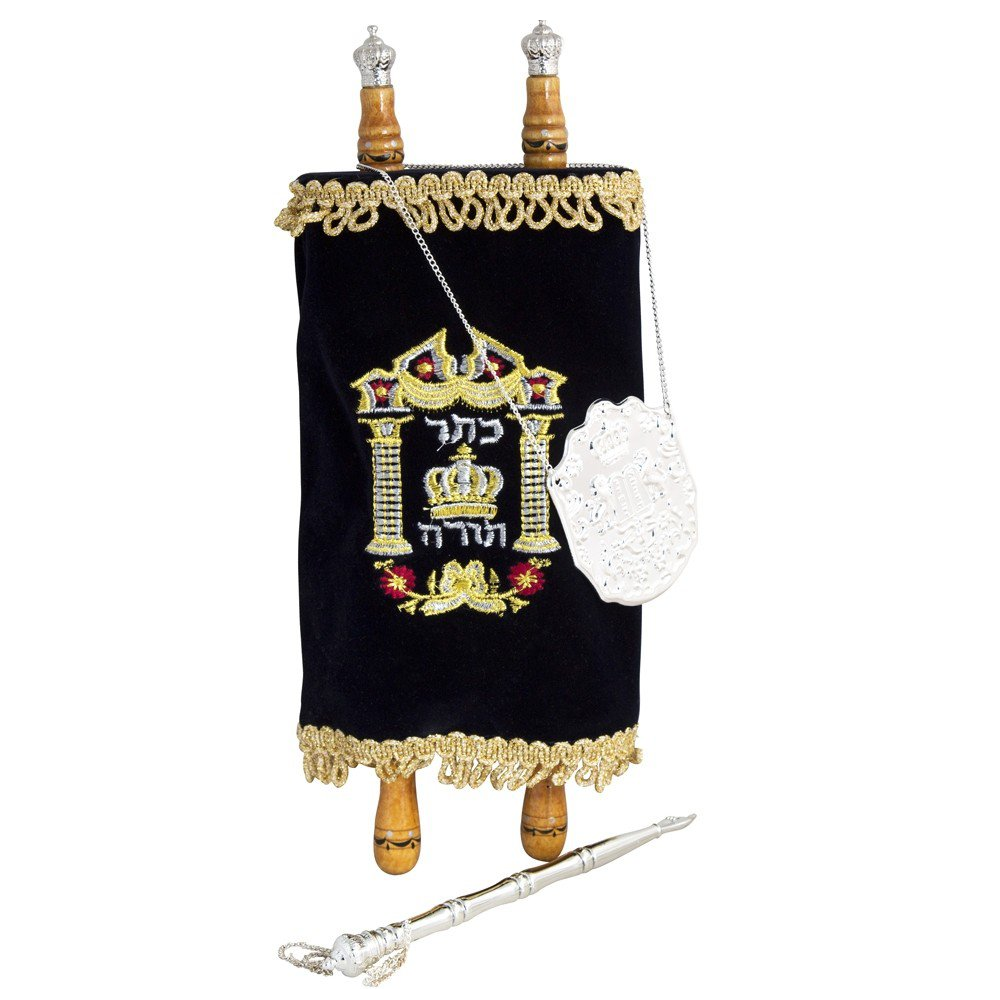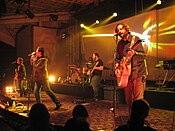|
Weekly Parashah |
|||||
| Torah: Lev. 14:1-15:33 | Haftara: 2 kings 7:3-20 | Brith Chadashah: Mt 8:1-17 Mk 1:35-45 |
|||
| Metzora (Leper) |
|||||
Scripture: |
Leviticus 14:1 - 15:33
|
Torah |
|||
|
|
14 Then Adonai spoke to Moses, saying: 2 “This is the Torah of the one with tza’arat in the day of his cleansing. He should be brought to the kohen, [a] 3 and the kohen is to go to the outside of the camp. The kohen is to examine him, and behold, if the mark of tza’arat is healed in one with tza’arat, 4 then the kohen is to command that two clean living birds, cedar wood, scarlet and hyssop be brought for the one being cleansed. 5 The kohen should command them to kill one of the birds in a clay pot over living water. 6 As for the living bird, he is to take it, the cedar wood, the scarlet and the hyssop, and dip them with the living bird into the blood of the bird that was killed over the living water. 7 He is to sprinkle on the one being cleansed from the tza’arat seven times and pronounce him clean, then release the living bird over the open field. 8 “The one to be cleansed must wash his clothes, shave off all his hair, and bathe himself in water. Then he should be clean. After that he may come into the camp, but is to dwell outside his tent for seven days. 9 Then on the seventh day, he is to shave all his hair from his head, his beard, and his eyebrows—he must shave off all his hair. He is to wash his clothes, and bathe his body in water. Then he will be clean. https://www.biblegateway.com/passage/?search=Lev.+14%3A1-15%3A33&version=TLV |
||||
Scripture: |
2 Kings 7:3-20
|
Haftarah |
|||
|
3 Now there were four men with tza’arat at the entrance of the gate; and they said to one another, “Why should we sit here till we die? 4 If we say: ‘Let’s go into the city,’ then the famine is in the city, so we will die there; but if we sit still here, we’ll die also. So come, let’s go into the camp of the Arameans. If they spare us, we’ll live; and if they kill us, we’ll just die.” 5 So they got up at twilight to go to the camp of the Arameans. But when they arrived at the edge of the Aramean camp, behold, no one was there! 6 For Adonai had caused the army of the Arameans to hear a noise of chariots and a noise of horses—indeed a noise of a huge army. So they said one to another, “Look, the king of Israel has hired against us the kings of the Hittites, and the kings of the Egyptians to assault us.” 7 So they got up and fled at twilight, abandoning their tents, their horses and their donkeys—the entire camp just as it was—and fled for their lives. 8 When these men with tza’arat came to the edge of the camp, they entered into one tent, ate and drank, and took from there silver, gold, and clothes, then went and hid them. Then they returned and went into another tent, and took from there too, and went and hid them. 9 Then they said to each other, “It’s not right, what we’re doing. This day is a day of good news, and we’re keeping silent! If we wait till the morning light, punishment will overtake us. Let’s go now and report to the king’s household.” 10 So they came and called out to the city gatekeepers, and told them, “We went to the camp of the Arameans, and look, there was not a single soul there, no human voice—just the horses and the donkeys tied up, and the tents just as they were.” 11 Then the gatekeepers called out, and it was reported to the royal palace inside. 12 When the king got up in the night, he said to his courtiers, “Let me tell you now what the Arameans have contrived against us. They know that we are hungry, so they went out of the camp to hide themselves in the field, thinking, ‘When they come out of the city, we’ll capture them alive and get into the city.’” https://www.biblegateway.com/passage/?search=2+kings+7%3A3-20&version=TLV |
 |
||||
Scripture: |
Matthew 8:1-17
|
Brit Chadashah |
|||
|
|
Healing Those who Trust8 When He came down from the mountain, large crowds followed Him. 2 And a man with tzara’at came to Him and bowed down before Him, saying, “Master, if You are willing, You can make me clean.” 3 Yeshua stretched out His hand and touched him, saying, “I am willing. Be cleansed.” Immediately his tzara’at was cleansed. 4 And Yeshua said to him, “See that you tell no one; but go show yourself to the kohen and offer the gift that Moses commanded, as a testimony to them.”[a] 5 Now when Yeshua came into Capernaum, a centurion came begging for help. 6 “Master,” he said, “my servant is lying at home paralyzed, horribly tormented.” 7 Yeshua said to him, “I’ll come and heal him.” 8 But the centurion said, “Master, I’m not worthy to have You come under my roof. But just say the word and my servant will be healed. 9 For I also am a man under authority, with soldiers under me. I say to this one, ‘Go!’ and he goes; and to another, ‘Come!’ and he comes; and to my servant, ‘Do this!’ and he does it.” 10 Now when Yeshua heard this, He marveled and said to those who were following, “Amen, I tell you, I have not found anyone in Israel with such great faith! https://www.biblegateway.com/passage/?search=Mt+8%3A1-17&version=TLV
Mark 1 : 35 – 4535 Very early, while it was still night, Yeshua got up, left, and went away to a place in the wilderness; and there He was praying. 36 Then Simon and those with him hunted for Yeshua. 37 And when they found Him, they said to Him, “Everybody’s looking for You.” 38 He said to them, “Let’s go somewhere else, to the neighboring towns, so that I may proclaim the message there also—this is what I came for.” 39 And He went throughout all the Galilee, proclaiming the message in their synagogues and driving out demons. 40 A man with tzara’at comes to Him, begging Him and falling on his knees, saying, “If You are willing, You can make me clean.” 41 Moved with compassion, Yeshua stretched out His hand and touched him. He said, “I am willing. Be cleansed.” 42 Immediately, the tzara’at left him, and he was cleansed. 43 Yeshua sent him away at once, sternly warning him. 44 He said to him, “See that you say nothing to anyone, but go show yourself to the kohen.[a] Then, for your cleansing, offer what Moses commanded, as a testimony to them.” 45 But he went out and began to proclaim and spread the word, so much that Yeshua could no longer enter a town openly but had to stay out in wilderness areas. Still, they kept on coming to Him from everywhere. https://www.biblegateway.com/passage/?search=Mk+1%3A35-45&version=TLV |
||||
Parashah in 60 seconds |
|||||
Music Styles Christian Rock
Styles
On this radio station you will find the following music styles;Christian Rock
Within EWCMI Online Radio we mark Christian rock is the form and styles of rock music that promotes Jesus and is typically performed by self-proclaimed Christian individuals and bands whose members focus the lyrics on matters of Christian faith.The extent to which their lyrics are explicitly Christian varies between bands.
History
Christian response to early rock music (1950s–1960s)
Rock music was not viewed favorably by most traditional and older Christians when it became popular with young people from the 1950s, although early rock music was often influenced by country and gospel music.
Religious people in many regions of the United States did not want their children exposed to music with unruly, impassioned vocals, loud guitar riffs and jarring, hypnotic rhythms. Rock and roll differed from the norm, and thus it was seen as a threat.[1] Often the music was overtly sexual in nature, as in the case of Elvis Presley, who became controversial and massively popular partly for his suggestive stage antics and dancing.
However, Elvis was a religious person who even released a gospel album: Peace in the Valley.[2]
The romantic, melodic rock songs of the band's early career had formerly been viewed as relatively inoffensive, but after the remark, churches nationwide organized Beatles record burnings and Lennon was forced to apologize.[5] Subsequently, the Beatles and most rock musicians experimented with a more complex, psychedelic style of music, that frequently used anti-establishment, drug related, or sexual lyrics, while The Rolling Stones sang "Sympathy for the Devil", a song openly written from the point of view of Satan.
This further increased the Christian opposition to rock music.
Countless new bands sprang up in the mid-to-late 1960s, as rock displaced older, smoother pop styles to become the dominant form of pop music, a position it would enjoy almost continuously until the end of the 20th century, when hip-hop finally eclipsed it in sales.
Roots (late 1960s–1980s)
Among the first bands that played Christian rock was The Crusaders, a Southern Californian garage rock band, whose November 1966 Tower Records album Make a Joyful Noise with Drums and Guitars is considered one of the first gospel rock releases,[6] or even "the first record of Christian rock",[7] and Mind Garage, "arguably the first band of its kind",[8] whose 1967 Electric Liturgy was recorded in 1969 at RCA's "Nashville Sound" studio.[9]
Larry Norman, often described as the "father of Christian rock music",[10] and in his later years "the Grandfather of Christian rock",[11] who, in 1969 recorded and released Upon This Rock, "the first commercially released Jesus rock album",[12] challenged a view held by some conservative Christians (predominantly fundamentalists) that rock music was anti-Christian. One of his songs, "Why Should the Devil Have All the Good Music?" summarized his attitude and his quest to pioneer Christian rock music.[13]
A cover version of Larry Norman's Rapture-themed "I Wish We'd All Been Ready" appears in the Evangelical Christian feature film A Thief in the Night and appeared on Cliff Richard's Christian album Small Corners along with "Why Should the Devil Have All the Good Music?".
Another Christian rock pioneer, Randy Stonehill, released his first album in 1971, the Larry Norman-produced Born Twice.[14][15] In the most common pressing of the album, side one is entirely a live performance.[16]
Christian rock was often viewed as a marginal part of the nascent Contemporary Christian Music (CCM) and contemporary gospel industry in the 1970s and '80s,[19] though Christian folk rock artists like Bruce Cockburn and rock fusion artists like Phil Keaggy had some cross-over success.
Petra and Resurrection Band, two of the bands who brought harder rock into the early CCM community, had their origins in the early to mid-1970s.
They reached their height in popularity in the late eighties alongside other Christian-identifying hard rock acts such as Stryper. The latter had videos played on MTV, one being "To Hell with the Devil", and even saw some airtime on mainstream radio stations with their hit song "Honestly".
Christian rock has proved less successful in the UK and Europe, although such artists as Bryn Haworth have found commercial success by combining blues and mainstream rock music with Christian themes.
1990s–present
The 1990s saw an explosion of Christian rock.
Many of the popular 1990s Christian bands were initially identified as "Christian alternative rock", including Jars of Clay, Audio Adrenaline and the later albums of dc Talk. Outside Anglophone countries, bands like Oficina G3 (Brazil) and The Kry (Quebec, Canada) have achieved moderate success. To date Delirious? has been one of the most successful bands from the UK.
By the late 1990s and early 2000s, the success of Christian-inspired acts like Skillet, Thousand Foot Krutch, Decyfer Down, Underoath, Kutless, Disciple and Relient K saw a shift toward mainstream exposure in the Christian rock scene.
Among popular Christian rock bands of the first decade of the 21st century that exemplified this trend were RED and Fireflight.
There are also some Roman Catholic bands such as Critical Mass. Some Eastern Orthodox Christian rock groups, mostly from Russia and the Soviet Union, started performing in the late 1980s and 1990s. Alisa[20] and Black Coffee[21] are credited as the most prominent examples. The Orthodox Christian lyrics of these bands often overlap with historical and patriotic songs about ancient Rus. Christian rock is on the rise in the Russian music underground in 2000s, and Orgia Pravednikov[22] is one of the most notable happenings.
The musical genre that was once rejected by mainstream Christian churches is now considered by some as one of the most-important recruitment tool of their successor congregations.
According to Terri McLean, author of New Harmonies, old-guard churches (United Methodist is given as an example) of the late 1990s were experiencing a rapid decline in membership and were under threat of disbandment within the next decade, a trend that has been going on since the 1980s.[23] McLean, using numerous quotes from theologians, Christian apologists and professors, goes on to offer contemporary Christian music as the reason for the falling popularity of more traditionalist churches.[24]
The definition of contemporary Christian, as offered by New Harmonies, is of a genre not far removed from traditional hymns; it is simply more accessible. The reality is that while a form of modernized hymns do exist in today's churches and do have an impact on church recruitment, there also exists both within and outside these churches a form of music (Christian rock) that has only one element in common with previous religious genres: its worship of God.
This element, the worship of God, is what was originally removed from or hidden within the lyrics of early, secular rock n' roll.
Santino described one method of changing Christian lyrics as a process that transformed “lyrics that sang of the mystical love of God into lyrics that celebrated the earthly love of woman”.[25]
Howard & Streck offer examples of this, comparing Ray Charles' “This Little Girl of Mine” to “This Little Light of Mine” and “Talking About You” to “Talking About Jesus”. They claim that because of actions such as this, despite the liberal editing of the original hymns, “gospel 'showed rock how to sing'”.[26] Howard & Streck go on to describe how the conflict between music and religion, spearheaded by southern fundamentalists, was originally racially based, but how in the sixties this moved on to a clash over the perceived lifestyle of rock musicians.[27]





























